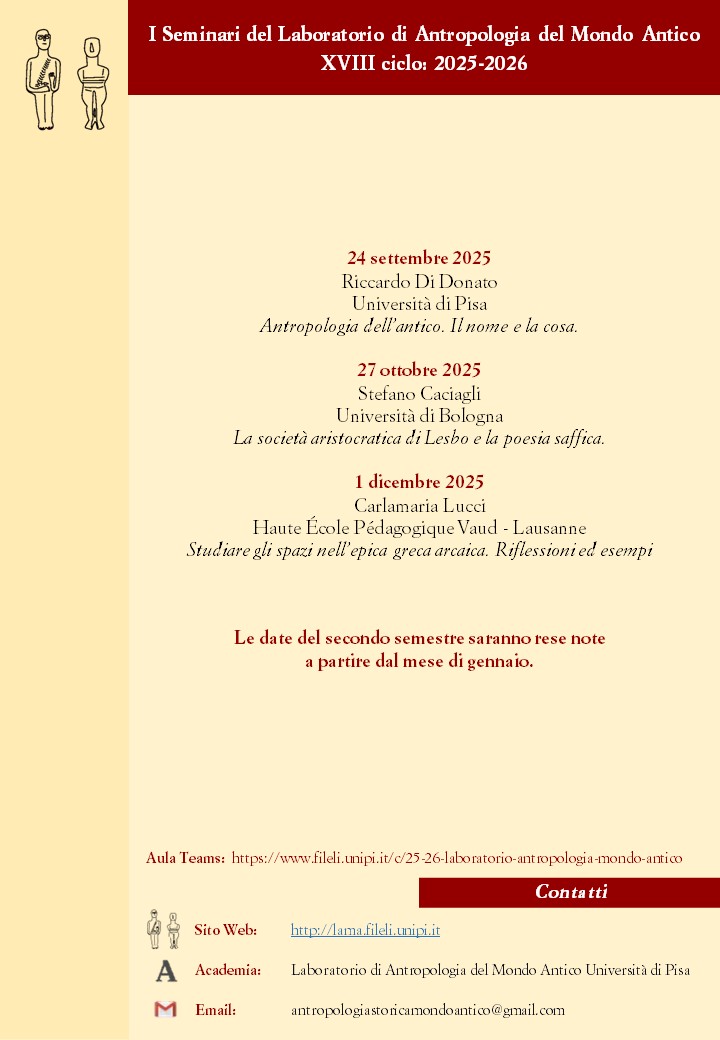Cfp for the conference: “Magic and Medicine in the Ancient World”. Vitoria-Gasteiz, September 18-19, 2019
Call for papers for the conference:
*Magic and Medicine in the Ancient World*
*Interactions, Convergences and divergences in a Complicated Romance *
International Conference, Vitoria-Gasteiz, September 18-19, 2019
In Antiquity, as is still very much the case today, illness and disease
could trigger a personal crisis in which a range of emotions from
uncertainty and restlessness to hope played a leading role. Given that in
such situations plagued with anxiety no one remedy was often enough to put
the ill at ease, the suffering often took recourse to all available
resources, both terrestrial and supernatural, in order to obtain a
longed-for cure. Accordingly, in many times and places medicine has gone
hand in hand with magical-religious practices. Indeed, since the
effectiveness of medical and therapeutical remedies were largely seen to
depend on the favorable intervention of a deity, these two types of
procedures were thought to work in tandem to bring about a patient’s
recovery.
If medicine is a discipline that seeks to restore an individual’s health
through empirical observation and the application of therapeutic remedies,
magic purports to influence a patient by supernatural means. Both medicine
and magic attempt to act upon the body, where these two forces can either
cooperate or, alternatively, vie with one another. Therefore, while
magical-religious practices could certainly work in conjunction with
medical treatments to cure the body through the use of amulets or
apotropaic objects, it is equally true that those same practices could be
used to attack the body, bombarding it with all sorts of spells and curses.
The ways in which medicine and magical-religious practices were perceived
to work together during Antiquity undoubtedly vary depending on the
specific historical and cultural context. In Assyria, Babylonia and Egypt,
arcane medical practices, for instance, are characterized by the equally
important role played by medical and magical-religious practices. This
helps explain why preserved recipes contain spells meant to cure diseases
caused by gods or demons. The magical aspects of these diseases, which are
clearly seen in the perceived causes and cures of these illnesses, are
always accompanied by (presumably) curative ingredients. Despite the
undeniable advances in medical knowledge, Greek and Roman societies, for
their part, lent enormous importance to supernatural manifestations. Even
after the birth of scientific medicine in sixth and fifth-century Greece,
the link between magic and medicine did not dissolve. In fact, this link
was influenced by new theories about diseases and cures as well as by
skepticism towards already accepted theories. Something similar is afoot in
Rome: upon its arrival to the *urbs* in the third century BCE, scientific
medicine lived side-by-side with popular medicine, which was strongly
influenced by magic, in the contemporary clinical theories that prestigious
Greek doctors expounded. By the second century CE, however, Galen denounced
the quacks that practiced a type of medicine based in spells. The vehemence
of his condemnation betrays the success of this type of medical practice in
second-century Rome.
While throughout Antiquity we can trace patterns of interaction and
influence between magic and medicine that result from historical cultural
idiosyncrasies, we should not run the risk of suggesting that this
relationship was static at any point: on the contrary, in any cultural
context the relationship between medicine and magic is a fluid one whose
limits and borders are often blurred and murky (see, for example, the
particularly slippery lexeme φάρμακον, which not only can refer to a
‘poison’ or ‘medicine,’ as Derrida famously argued, but also to a ‘spell’,
‘charm’ or ‘philtre’). The relationship between both forces is undoubtedly
an extremely rich and complex one, upon which a range of sources, such as
clay tablets, literary and juridical sources, iatromagical papyri and the
epigraphic record broadly speaking, shed light.
This workshop seeks to provide an interdisciplinary forum in which new
approaches to the relationship between magic and medicine can be discussed
and debated. We invite scholars of antiquity (e.g. historians, epigraphers,
archaeologists, papyrologists, philologists, cultural theorists and
philosophers) who have completed a doctoral dissertation and have a
developed academic interest in the topic to submit an abstract on the
interaction between magic and medicine in ancient Mediterranean cultures.
We are eager to receive proposals that tackle this question from early
Mesopotamian cultures and Egypt all the way through Late Antiquity. We
welcome scholars working with any type of evidence (literary,
archeological, epigraphic, papyrological, etc.).
Those who are interested in participating in the workshop should send an
abstract (ca. 250-300 words written in Spanish, English, French or Italian)
to magandmed2019@gmail.com < mag&med2019@gmail.com>. Speakers will be
allotted 20 minutes to present their research as well as an additional 10
minutes to field questions. Abstracts should be sent by June 30, 2019. As
soon as the organizing committee has reviewed all proposals, speakers will
be contacted in July.

